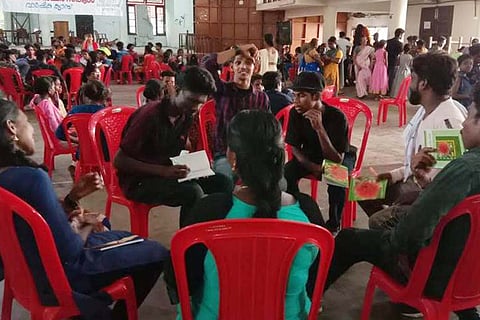

Tribal activists in Kerala are calling for an urgent intervention by the state government, over the hurdles faced by hundreds of tribal students who are seeking admission for undergraduate courses in colleges and to ‘Plus One’ classes in schools. From the problem of miscommunication to lack of assistance for the students, activists allege that the admission procedure to the universities and higher secondary courses are discriminatory to tribal students.
One of the major issues faced by the students is the lack of assistance to enable them to apply for the courses in time. According to the activists closely working with them, many students have been left out, without proper guidance for the online admission procedure amid the coronavirus pandemic.
“In the wake of COVID-19, it has been also difficult for people like us to directly reach out to tribal hamlets. In case of Plus One admissions, the students are first required to apply online, then create a ‘candidate login’ using an OTP (One Time Password) they receive. Then, students should submit the documents online and remit application fees etc,” explains Mary Lidiya, coordinator of Adishakti Summer School, an initiative of Adivasi Gothra Mahasabha.
There are help desks in every government-run and government-aided school to help students complete the admission procedure without hassle. Lidiya says that for the tribal students, most of whom had been studying in model residential schools, it is not possible to use these facilities arranged in schools as they were sent back to their homes, owing to COVID-19.
“For these students, especially those hailing from communities like Cholanaikkans, Kurumbas, Kattunaikans, Kadars and Koragas, who live in the interior forest regions, it is difficult to access these help desks,” she adds.
The situation is also grim for degree aspirants. According to activists, even before the ‘Save a Year’ exams are conducted for those who could not write the Class 12 exam due to the COVID-19 situation or for those who failed to crack the minimum score, admissions to various universities are wrapping up.
Adishakti Summer School is one of the few platforms that work for the welfare of tribal students in the state. Every year, the summer school conducts residential camps, during which it used to help hundreds of students successfully complete their admission procedure. But this year, due to COVID-19 pandemic, camps could not be conducted.
Though activists of the Adivasi Gothra Mahasabha including M Geethanandan, have been writing letters to the state government citing the various issues faced by the students, nothing has been effectively addressed, they say.
“As per a study in 2013, in Wayanad -- the district which houses the maximum number of tribal population, out of all the tribal students who completed Class 10, only 10% enrolled in higher secondary school. The dropout rate was 90%. Though there are more aspirants, issues like less number of reservation seats are a hindrance to students. It is on top of this, that the students now have to tackle the issue of online admission. With no proper assistance mechanism reaching them, this will also be a major factor leading to dropouts this year,” Geethanandan, coordinator of Adivasi Gothra Mahasabha told TNM.
Another prime concern which the activists have been highlighting is the financial burden for these students in completing admission procedures.
For the students who live in various tribal hamlets, coming to towns and cities to educational institutions to attend interviews and complete admission has been a costly affair, activists say.
“From the application fees remitted to apply in colleges to the transportation charge to educational institutions as part of admission and the accommodation expenses, the students are compelled to spend an amount which is unbearable to them. Though these expenses might sound silly for many, it is very huge for these students hailing from the tribal families,” says Lidiya.
Though upon the request of various tribal activists, the Directorate of Scheduled Tribes Development had written to the government to relieve the students of scheduled tribes from online application fees, in last August, activists allege there has been no response.
“Considering the social and economic situation, the students should be given a grant to complete their admission procedures, this is our request in this regard,” adds Lidiya.
Read:
Watch children in Idukki walking long distances to access virtual classes: